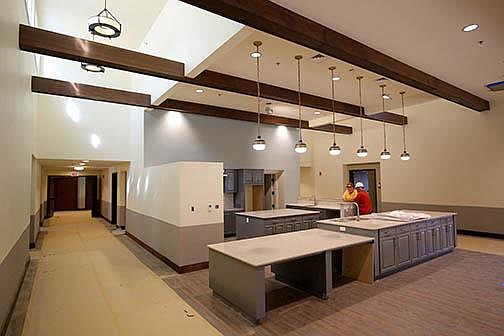Despite covid-19, Arkansas’ new state-run veterans homes managed a substantial year-to-year financial turnaround — going from $1.2 million in the red to a $425,000 profit.
Fiscal 2020, which ended June 30, was the first year the Arkansas State Veterans Home at North Little Rock was profitable since opening in early 2017, according to state records.
Gov. Asa Hutchinson lauded the home’s reversal of deficits in a Friday statement.
“I am thrilled with the experienced leadership of the [North Little Rock] veterans home,” he said. “For the first time, the home can increase its fund balances that will support future improvements and the high-quality care our veterans enjoy at our state veterans homes.”
Challenges during the pandemic remain for both of the state-run nursing homes for veterans and their eligible dependents. The state’s other facility, in Fayetteville, has suffered a decrease in occupancy this year, according to statistics provided by the Arkansas Department of Veterans Affairs.
In spite of having fewer residents, the Fayetteville location also finished the fiscal year out of the red with a profit of nearly $60,000, state officials said.
The facility in North Little Rock has maintained an occupancy of 95% or higher almost every month since July 2019. The exceptions were May and June of this year, which saw that dip to 94%, said Sue Harper, an Arkansas Department of Veterans Affairs spokeswoman.
By comparison, the Fayetteville location has seen occupancy drop from 88% in October 2019 to as low as 78% in May, records show. In June, it ticked upward to 80% occupancy.
The North Little Rock home filled all of its 96 beds in July 2019, which improved its economic situation. The slower-than-expected growth during its first couple of years of operation was attributed to staffing shortfalls and construction problems, state officials said at the time.
The North Little Rock facility was built on land previously used as a golf course. It adopted a cottage-home-style scheme, which spaced out the living areas across a large campus. During its construction, it was touted as a state-of-the-art design.
Jeanette Wood of Cabot has a brother — a 76-year-old Navy veteran with Parkinson’s disease — at the North Little Rock home. She said she and her other brother visit him two or three times per week.
The spaced-out layout at the campus has been beneficial during these social-distancing-minded times, Wood said. She also said the staff has been vigilant about making sure visitors and residents protect themselves from the virus.
“I’m very well pleased with all of the precautions that are being taken there, and I’m pleased with the care he is getting,” Wood said.
Visitors are required to make appointments in advance. The resident meets his visitor outside the cottage. Everyone is required to wear face coverings, Wood said.
During moments of inclement weather, the facility provides an air-conditioned area for visitors that includes glass partitions to protect them and the residents. Everyone is required to wear masks inside, and the areas are sanitized often, Wood said.
Covid-19 has had some impact on staff members at both of the state-run facilities, but it hasn’t been as overwhelming compared with that at other senior facilities across the country, Harper said.
The Fayetteville facility, which has a more traditional design, had seven residents and six staff members test positive for covid-19, according to the state.
Two of those veterans died of covid-19-related symptoms, Harper said.
She pointed out that “no loss [of life] is acceptable,” but the prevention of a significant covid-19 spread is “attributable to the continued support” that the facility receives.
She also said both homes are on “firm footing” in terms of preventing any significant outbreak.
The infections at the Fayetteville location were contained to one of the home’s two floors, Harper said.
The North Little Rock facility had five staff members but no residents test positive, Harper said.
“One cannot forget who the large majority of our residents are — they are veterans, and by nature they are fighters,” Harper said, adding that the pandemic has reminded everyone that their resilience is “indelible.”
Based on the numbers, the virus has not had a significant impact on the residential occupancy, although fiscal 2021, which started July 1, is expected to be a stronger indicator.
David Barker, the administrator at the North Little Rock facility, resigned in October 2019, but returned a few months later to retake the job. Harper said Barker led the home “through a tremendous turnaround” that saw its financial fortunes improve by more than $1.6 million.
Barker returned to the job at the same $126,048 annual salary as when he was first hired, but was awarded a merit increase in July and now earns $129,199 per year, Harper said.
